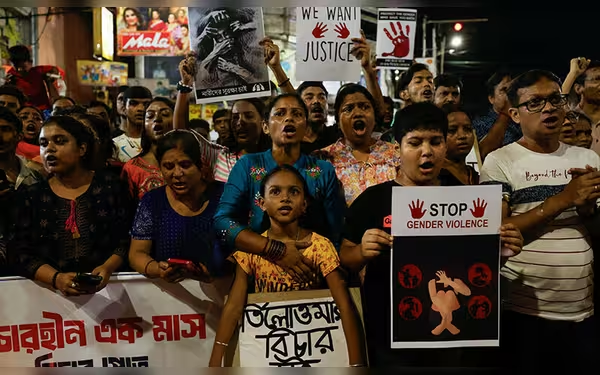Saturday, November 16, 2024 09:26 PM
Indian Doctor Hospitalized After Hunger Strike Over Colleague's Murder
- Doctor hospitalized after hunger strike protest.
- Outrage over rape and murder of fellow medic.
- Supreme Court establishes hospital safety task force.
 Image Credits: dawn
Image Credits: dawnIndian doctor Aniket Mahato hospitalized after hunger strike protesting colleague's tragic rape and murder, sparking nationwide outrage.
In a distressing turn of events, a junior doctor in India, Aniket Mahato, has been hospitalized after going on a hunger strike to protest the tragic rape and murder of a fellow medic. This incident has sparked outrage and concern among medical professionals across the country, highlighting the pressing issues of safety and security in hospitals.
Mahato, along with six other doctors, initiated their hunger strike on Sunday, demanding better facilities and enhanced security measures for healthcare workers. Many doctors in India endure long shifts in overcrowded and unsanitary conditions, which has raised serious questions about their safety and well-being. According to Soma Mukhopadhyay, a professor at the hospital, Mahato was admitted in a critical state, suffering from severe dehydration and an unstable condition. "When he was admitted he was severely dehydrated, pulse rate was very high and was in a very unstable condition," she stated. Fortunately, by Friday afternoon, his vital signs showed improvement, although further investigations are necessary to assess any potential damage.
The catalyst for this protest was the horrific incident involving the rape and murder of a 31-year-old doctor at RG Kar Hospital in Kolkata, West Bengal. This tragedy has ignited a wave of protests from doctors nationwide, who are demanding greater workplace safety for women and justice for their slain colleague. In response to the growing unrest, India’s Supreme Court has taken action by establishing a hospital safety task force.
The Indian Medical Association, the largest body representing doctors in the country, has also voiced its concerns. They sent a letter to the chief minister of West Bengal, urging immediate attention to the plight of the striking doctors. Their demands include increased police protection in hospitals and a thorough investigation into alleged corruption within several medical colleges.
This situation underscores a critical issue that extends beyond the walls of hospitals. It raises important questions about the safety of healthcare professionals, particularly women, who often face harassment and violence in their workplaces. As the protests continue, it is essential for authorities to listen to the voices of these medical professionals and take decisive action to ensure their safety. The health and safety of doctors are paramount, not only for their well-being but also for the quality of care they provide to patients. In a country where healthcare is already under strain, ensuring a safe working environment for doctors is not just a demand; it is a necessity.













